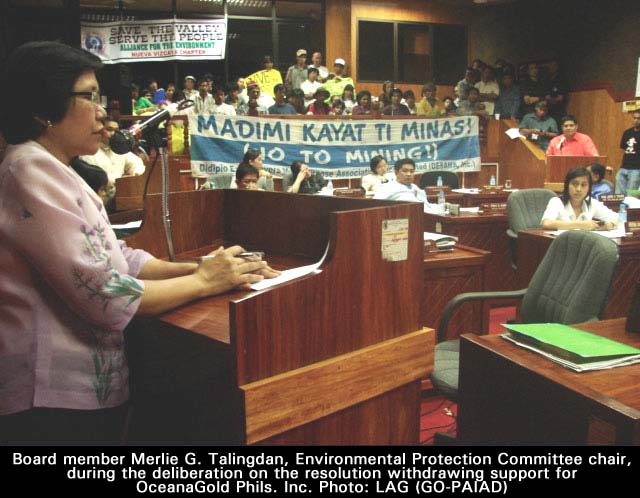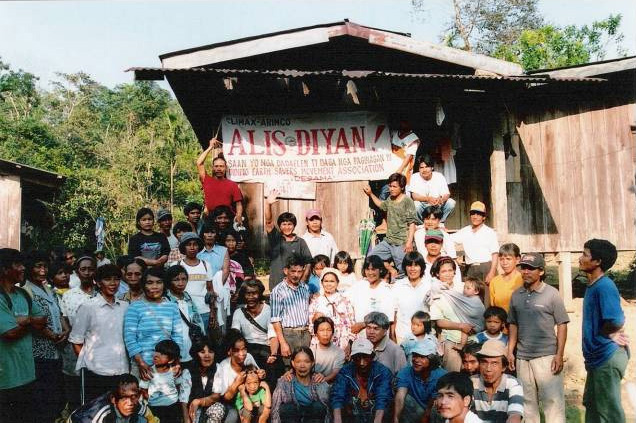
Last December 29, 2009, OceanaGold filed a petition for certiorari seeking to annul and set aside the order of Judge Panay denying the mining company’s motion to dismiss the case lodged at the Bayombong, Nueva Vizcaya Regional Trial Court Branch 30. In 27 February 2008, the Regional Trial Court (RTC) in Bayombong restrained OceanaGold from demolishing the houses of indigenous peoples in the upland village of Didipio. The RTC granted a temporary restraining order (TRO) in favor of the indigenous peoples and cited in its decision that OceanaGold’s demolition activities are “tainted with irregularity and contrary to law.”
According to Manong Peter Duyapat Chairperson of Didipio Earth Savers Multi-purpose Association (DESAMA), a delegate to the 2009 convention of the United Nations Committee on the Elimination of all forms of Racial Discrimination (UNCERD), and a leader of the resisting Ifugaos in Barangay Didipio “We are happy upon hearing this decision of the Court of Appeals. This for us is a step closer in making OceanaGold accountable for violating our constitutional rights and depriving us of due process of law.”
The Court of Appeals in its resolution dated February 22, 2010 “finds no reason to hold that respondent judge acted with grave abuse of discretion nor does it see the assailed orders to be patently erroneous to allow petitioner to avail of the extra-ordinary remedy of certiorari” and “DISMISSED” the petition “for lack of merit.”
Gerry Arances, Campaigns Paralegal of Legal Rights and Natural Resources Center — Luzon (LRC-KsK) asserts that “This is a big blow to the mining company because obviously they were so desperately trying to delay and/or have the case dismissed through the Court of Appeals’ intervention.” “With this decision of the Court of Appeals, OceanaGold will be finally tried for the violent demolition committed against the indigenous Didipio community in 2008,” Arances adds.
“This is indeed a victory of our community. We have long prepared for this trial and we will remain to be vigilant for any move of the mining company to avoid being accountable as it has done time and again,” Manong Peter concludes.

I am Peter Duyapat, belonging to the Ifugao indigenous community living in Didipio, Municipality Kasibu, province of Nueva Vizcaya. I am the leader of our local organization, the Didipio Earthsavers Multipurpose Association. In the early 1960s, because of limited livelihood options and poverty, the then Commission on National Integration (CNI) encouraged my family and other Ifugao families to relocate to Didipio, Municipality of Kasibu, Nueva Vizcaya from Hungduan, Ifugao Province so that we can establish our community there. Here, we were able to set up our agricultural farms to feed our families. Together with other settlers, we were able to live satisfactorily and our children were able to go to school.
Madam Chair, the problem came when the Philippine government awarded a Financial or Technical Assistance Agreement to Arimco Mining Corporation, an Australian mining company, in 1994. Our free, prior, and informed consent was not given to them, and yet, despite this, the Philippine government allowed the entry of the international mining corporation even with our adamant opposition. In the following decades, we have suffered numerous human rights violations. This would include demolition of our houses, blocking our ingress and egress from the area, physical abuses against other indigenous members of our community, filing strategic lawsuits against public participation, and many more. The most recent of which, when I, myself, last April 2009, was physically attacked by company guards led by the security head and was brought to the Philippine National Police who did not do anything to protect me. I was only released when people came to demand for my release.
We sought the assistance of the National Commission on Indigenous Peoples (NCIP), especially with regard to the absence of FPIC [free, prior and informed consent] for the mining operations. However, we were told that because we were migrant IPs [indigenous peoples], we did not have the right to FPIC. Added to this, we were charged with criminal cases by government agencies, the Department of Environment and Natural Resources, for illegal occupation of forest lands, despite the fact that it was also the government that encouraged us to settle in our area in the early 1960s. Ironically, Madam Chair, they allow mining operations on forest lands which should be prohibited, but do not respect our rights as migrants and long-term settlers.
Madam Chair, there have been a number of times that the mining company, now OceanaGold Philippines, Inc., demolished and/or attempted to demolish our homes for the mining operations. Most of the times, the company was accompanied by members of the Philippine National Police. Currently, allegedly because of President Gloria Macapagal-Arroyo's order, military forces are now deployed in our area. During the past years, President Arroyo has implemented her policy on foreign investments through the establishment of the Investment Defence Forces, wherein military resources of the country are used for the benefit of the corporations, but on the other hand, undermines our rights to voice our opposition.
In light of this, we would therefore like to make the following recommendations:
*Note:
The UN Human Rights Council's Expert Mechanism on the Rights of Indigenous Peoples (EMRIP) held its second session from 10 to 14 August 2009 in Geneva. During the meeting, the Expert Mechanism held an interactive dialogue with participants on its draft study on lessons learned and challenges to achieve the implementation of the right of indigenous peoples to education, with a view to presenting a completed study to the Human Rights Council at its 12th session (14 September to 2 October). The five-day meeting also provided an opportunity for participants to discuss developments in implementing the UN Declaration on the Rights of Indigenous Peoples, focusing on the implementation of the Declaration at the regional and national levels, as well as on adjudication, remedies, repatriation, redress and compensation. The UN Special Rapporteur on the situation of human rights and fundamental freedoms of indigenous people, Professor S. James Anaya, attended the session and held separate meetings with participants.
 Home | Aims and Objectives of Solidarity Philippines Australia Network | About Kasama
Home | Aims and Objectives of Solidarity Philippines Australia Network | About Kasama 
Search the SPAN Web